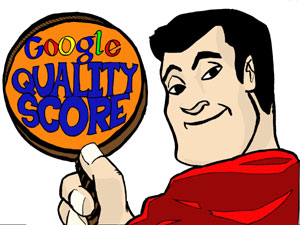
This week we’ve been dissecting the Google AdWords Quality Score. Each day we have been pulling back the layers of the ever-expanding Quality Score. Hopefully, all of the information we’ve been providing has been helpful and will allow you enhance your campaign’s performance. However, be cautious because as you optimize your account in order to improve your AdWords Quality Score, you may very well injure and hinder your Quality Score inadvertently.
There are two important elements of your account that are actually quite fragile when it comes to your Quality Score: keywords and ad texts. First, lets discuss how to make common keyword changes without negatively your Quality Score.
The PPC Hero Team is all about optimizing ad groups for higher relevancy and increased click-through rates. In order to do this you will need to re-arrange your keywords into to tight-knit ad groups and this will mean moving your keywords. Moving your keywords can effect your AdWords Quality Score, and here is how Google can view these changes:
- A keyword’s Quality Score is influenced by its relevance to the ads in its ad group. If you move a keyword to an ad group with more relevant ads, therefore, its Quality Score may improve. Similarly, the Quality Score may decrease if the ads are less relevant.
- In addition, moving a keyword to an ad group with more relevant ads can improve a keyword’s click-through rate going forward. This, over time, will improve its Quality Score.
- Landing page quality is another Quality Score factor. Moving a keyword to an ad group with a different landing page can therefore change its Quality Score.
When moving keywords in the past, we’ve seen some seriously negative affects within our accounts. Basically, we have restructured accounts in the past (to make them better!) and our performance has tanked. After a few weeks we have gotten every campaign back on track, but here a few tactics we’ve learned to employ when moving keywords:
Don’t move all of your keywords at the same time. The AdWords system may take up to a few weeks to reassess the keyword’s Quality Score in the context of the ads and landing page in its new ad group. During this time you may see stronger fluctuations in Quality Score than usual, as the system processes the new information. We have found optimizing 1-2 campaigns at a time can help mitigate these negative effects.
Move your ad texts with your keywords. Your ad texts and keywords have a symbiotic relationship. This means they are dependent on each other. If you move keywords out of one ad group into another, copy the existing ad text into your new ad group as well. This is because those keywords have already established a relationship with those ads (in the eyes of Google). If you sever this bond, your keywords are basically starting from zero.
Editing your ad texts, which is an everyday aspect of campaign management, can also seriously impact your AdWords Quality Score.
The AdWords system treats an edited ad like it’s brand new and has no performance history. And remember, ad position is partly determined by an ad’s relevance to the search query as well as its historical performance on Google. Editing your ad, therefore, can affect its position.
To mitigate any negative impacts of ad text editing, here are a few tips:
Never deleted all of your ads. You need to continually test against your best performing ads. This way you are optimizing for the best click-through rate while maintaining your Quality Score.
Insert new ads, don’t just edit old ads. When you are ready to insert a new ad, don’t just edit an older ad and re-set the performance history to zero. Pause the old under-performing ads and insert new ads. This way your not setting all of your ads’ history back to zero.
Optimizing your account and improving your Google AdWords Quality Score takes time and effort, and we just want to make sure that you’re not hindering your account when you’re actually trying to help. Following some of these tips will help mitigate some of the growing pains.




